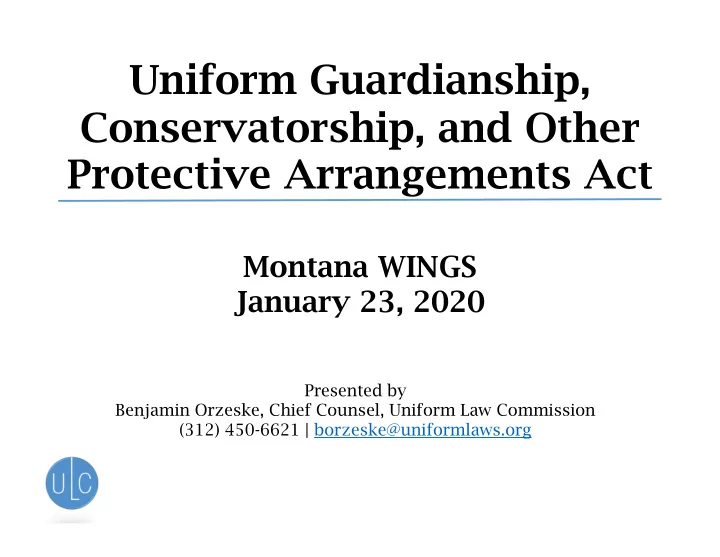

Uniform Guardianship, Conservatorship, and Other Protective Arrangements Act Montana WINGS January 23, 2020 Presented by Benjamin Orzeske, Chief Counsel, Uniform Law Commission (312) 450-6621 | borzeske@uniformlaws.org
What is the ULC? Uniform Law Commission (ULC) • Non-profit organization formed in 1892 • Commissioners are volunteer attorneys • appointed by the states ULC drafts model state legislation on topics • where uniformity among the states is desirable Legislative staff based in Chicago • headquarters www.uniformlaws.org •
Political Landscape Typically a bi-partisan issue • Issue isn’t “hot”…UNLESS there’s a crisis • or tragedy Broad issue and could be a very long • process No one-size-fits-all solution • Lack of data • Policy wonks aren’t necessarily on-the- • ground/frontline, workers and vice versa
Common Issues Across States • Caregiving • Shortage of Guardians • Public Guardianship • Abuse/Financial Exploitation • Accountability and Court Monitoring • Individual Rights • Alternatives to Guardianship • Lack of Good and Consistent Data • State Budgetary Constraints
Who Created UGCOPAA ULC Drafting Committee Prof. David English, Chair | Prof. Nina Kohn, Reporter
UGCOPAA Terminology “Guardian” means a person appointed by the court to make decisions with respect to the personal affairs of an individual. “Conservator” means a person appointed by a court to make decisions with respect to the property or financial affairs of an individual. “Less restrictive alternative” means an approach to meeting an individual’s needs which restricts fewer rights of the individual than would the appointment of a guardian or conservator. The term includes supported decision making, appropriate technological assistance, appointment of a representative payee, and appointment of an agent by the individual, including appointment under a [power of attorney].
Person-Centered Terminology Old: • Ward • Alleged incapacitated person • Incapacitated person New: • Adult/Minor • Respondent • Adult/Minor subject to guardianship/conservatorship
Seven Key Reforms 1. Expanded Procedural Rights 2. Less-Restrictive Alternatives 3. Individual Guardianship Plans 4. Enhanced Monitoring 5. Informal Grievance Procedure 6. Clear Decision-Making Standards 7. Right to Social Interaction
Expanded Procedural Rights Strengthens the requirement for the • respondent to be present at the hearing (audio/video hearings permitted). Requires findings before removal of • fundamental rights (e.g. vote, marry). Attorney must advocate for the client’s wishes. • Plain-language notice of key rights. • Limits guardian’s ability to charge fees to • oppose the individual’s efforts to change terms of the appointment. Automatic triggers for reconsideration. •
Less-Restrictive Alternatives Petitioners seeking guardianship or • conservatorship must explain why a less restrictive alternative is not sufficient. Courts may treat a petition for • guardianship or conservatorship as a petition for a less-restrictive alternative. Courts ordering guardianship or • conservatorship must include findings explaining why a less-restrictive alternative is not sufficient.
Individual Guardianship & Conservatorship Plans Guardian or conservator must file a plan • within 60 days of appointment, with copies to whomever the court directs. Plan must include: • Living arrangements, services, and supports; Social and educational activities; Persons with whom the adult has personal relationships and plans for facilitating visits with those persons; Nature and frequency of guardian’s communication with the adult; Goals, including future restoration of rights; Statement of proposed charges & expenses. Plan must be updated at least annually. •
Enhanced Monitoring Guardians must submit an annual report. • Court can compare the report to the individual’s plan to determine whether the guardian/conservator is in compliance. Court can appoint respondent’s loved ones • to receive notice of all hearings, copies of plans, and notice of certain major events (e.g. change of residence, health, etc.). A no-cost alternative to court monitoring • of guardianship/conservatorship.
Informal Grievance Procedure Any interested person who reasonably • believes the guardian/conservator is out of compliance may submit a grievance to the court in writing. No formal petition necessary. • Court required to review and respond as • appropriate, unless a similar grievance was filed in the previous six months.
Clear Decision-Making Standards Guardians are required to: make the decision the they “reasonably believe the adult • would make if the adult were able unless doing so would unreasonably harm or endanger the welfare or personal or financial interests of the adult.” “consider the adult’s previous or current directions, • preferences, opinions, values, and actions, to the extent actually known or reasonably ascertainable” to determine the decision the adult would make. make the decision that is in the best interest of the adult if • the guardian cannot determine what decision the person would make or the decision would unreasonably harm the welfare or interests of the adult.
Clear Decision-Making Standards Conservators are required to: “make the decision the conservator reasonably believes the • individual would make if the individual were able unless doing so would unless doing so would fail to preserve the resources needed to maintain the individual’s well-being and lifestyle or otherwise unreasonably harm or endanger the welfare or personal or financial interests of the individual.” use a best interest approach if – and only if – the • conservator cannot determine what decision the individual would make or the individual’s decision would fail to preserve resources needed to maintain the individual’s well- being and lifestyle or otherwise would unreasonably harm or endanger the individual or the individual’s interests.”
Right to Social Interaction Details about social interaction (who, • where, how often, etc.) go into the plan. Without court approval, a guardian for an • adult may not indefinitely restrict interaction with another person unless the guardian has good cause to believe interaction poses a risk of significant physical, psychological, or financial harm. Restriction limited to 7 days if the person • has a family or pre-existing social relation- ship with the adult, otherwise 60 days.
UGCOPAA: Taking Action • Identify key stakeholders in your state • Acknowledge and answer tough questions up front • Put a local face on the issue • Seek a sponsor • Prepare a bill draft • Make your voices heard • Keep at it
Thank you!
Recommend
More recommend